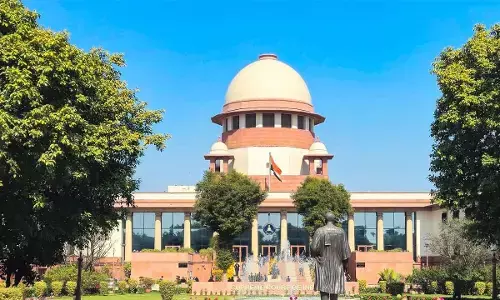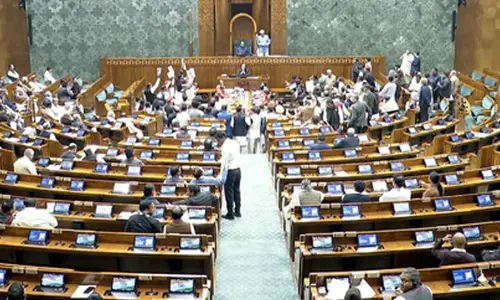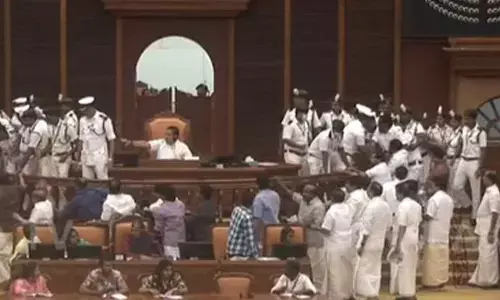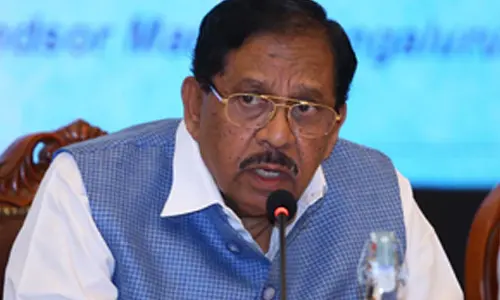Good climate governance

The inconvenient truth is not that global warming is undeniably unequivocal but that we are unable to address it with the required urgency. And the convenient truth is not that India is entering a demographic dividend period and has a demagogue Prime Minister,
The inconvenient truth is not that global warming is undeniably unequivocal but that we are unable to address it with the required urgency. And the convenient truth is not that India is entering a demographic dividend period and has a demagogue Prime Minister, but that India is yet to draw a road map to leverage these rewards and gains to deal with the climate change.
The unfortunate fact is that the developing countries are eternally arguing for international climate finances that are unlikely to come so easily, as is evident from the Lima (Peru) negotiations. At the same time we should not overlook the fact that a country like India can gain extraordinary benefits for the poor section of its society by self-financing the decarbonisation of the national economy.
India can take pride that it has now an inspiring leadership in the form of PM Modi. That inspiration comes from his creative ideas as well as from novelty in approaches to implement them. We all studied for ages that 'cleanliness is godliness'. The last leader to reinvigorate a clean India campaign on a mass scale and leading it by example was Mahatma Gandhi in 20th century.
The Lima meeting on climate change comes at opportune time when PM Modi's Clean India and Good Governance campaigns launched at the national level could converge and transform into a major effective antidote for global climate problems and also strengthen its commitment towards the poor people of India.
Climate change is defining challenge of our times, as stated by the UN Secretary General Ban Ki-moon. Many would say that the same can be said about poverty, terrorism, malnutrition, inequality and emerging diseases like SARS and Ebola hitherto unknown to humanity. But not many realise that climate change is the father of all crises.
A World Health Organization (WHO) report in May 2014, stated that New Delhi's air pollution monitors measured levels of particulate matter smaller than 2.5 micrometres - the small particles considered among the most dangerous for lung health - exceeding 350 micrograms per cubic metre of air - one of the highest levels recorded in Asia.
The emission from burning of coal-fired power generation plants, which is the main reason for increase of concentration of green house gases in the atmosphere, is also the main cause of air-pollution. Biomass burning for cooking, open brick kilns, open burning of vegetation and waste also cause in- and out-door pollution. According to another WHO report, in- and out-door air pollution in 2012 caused the premature deaths of around 7 million people worldwide, mainly poor women and children.
Dealing with climate change could prove to be a convenient way to tackle air pollution. Improving the energy efficiency of all electrical appliances like air-conditioners, fans and lighting by about 10-15 percent could help India in reducing coal consumption in the power generation plants, thereby reducing air pollution. India can avoid the unnecessary investment in building at least 120 big power generating plants of 500 MW as per the report of National Energy Research Laboratory of Berkley in USA.
India's leadership in agreeing to reduce emissions of powerful Hydrofluorocarbons ( HFCs) and refrigerants used in air-conditioners could catalyze the energy efficiency revolution as hinted in the communiqué signed between President Obama and PM Modi in Washington DC, this September. Enhancing the fuel efficiency standards in vehicles, trains, ships and planes is also required.
It is important for India to propose 'Good Climate Governance,' which is as the theme to move towards Paris 2015 where the world is likely to make and strengthen its commitment to keep the rise in global temperature below 2 degrees Celsius. Good climate governance is about decision-making that should be participatory - that includes all vulnerable and least developed countries, consensus oriented - unlike what happened in Copenhagen. It is about being accountable to the loss and damage, transparent to the needs of the poorest countries and following the rule of the UN Framework Convention on Climate Change (UNFCCC).
"Maximum governance and minimum government" is PM Modi's mantra for coming years. India in Lima should pitch for 'maximum climate governance and minimum sliding-back governments' as the way forward to Paris 2015.
By:Rajendra Shende








